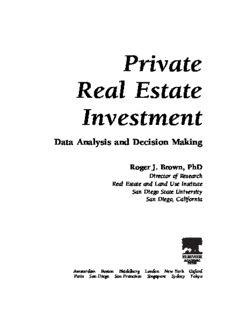
Private Real Estate Investment: Data Analysis and Decision Making (Academic Press Advanced Finance Series) PDF
Preview Private Real Estate Investment: Data Analysis and Decision Making (Academic Press Advanced Finance Series)
Private Real Estate Investment Data Analysis and Decision Making Roger J. Brown, PhD Director of Research Real Estate and Land Use Institute San Diego State University San Diego, California Amsterdam Boston Heidelberg London New York Oxford Paris San Diego SanFrancisco Singapore Sydney Tokyo This page intentionally left blank Private Real Estate Investment Data Analysis and Decision Making ElsevierAcademicPress 200WheelerRoad,6thFloor,Burlington,MA01803,USA 525BStreet,Suite1900,SanDiego,California92101-4495,USA 84Theobald’sRoad,LondonWC1X8RR,UK Thisbookisprintedonacid-freepaper. Copyright(cid:1)2005,ElsevierInc.Allrightsreserved. No part of this publication may be reproduced or transmitted in any form or by any means, electronic or mechanical, including photocopy, recording, or any information storage and retrievalsystem,withoutpermissioninwritingfromthepublisher. PermissionsmaybesoughtdirectlyfromElsevier’sScience&TechnologyRightsDepartmentin Oxford,UK:phone:( 44)1865843830,fax:( 44)1865853333,e-mail:permissions@else- þ þ vier.com.uk. You may also complete your request on-line via the Elsevier homepage (http:// elsevier.com),byselecting‘‘CustomerSupport’’andthen‘‘ObtainingPermissions.’’ LibraryofCongressCataloging-in-PublicationData BritishLibraryCataloguinginPublicationData ISBN: 0-12-137751-2 ISBN: 0-12-088532-8(CD-ROM) ForallinformationonallAcademicPresspublications visitourWebsiteatwww.academicpress.com PrintedintheUnitedStatesofAmerica 04 05 06 07 08 09 9 8 7 6 5 4 3 2 1 ‘‘Is life mathematics or is it poetry?’’ Roger Mague´re`s This page intentionally left blank CONTENTS Preface xiii Acknowledgements xix 1. Why Location Matters: The Bid Rent Surface and Theory of Rent Determination Introduction 1 Classical Location Theory 2 Notation Guide 2 The Model 3 Example #1—Two Competing Usersin theSame Industry 3 Example #2—Several Competing Users inDifferent Industries 5 Is the Bid Rent Curve Linear? 7 Empirical Verification 8 An Economic Topographical Map 12 Relaxing the Assumptions 13 A Window to the Future 16 References 17 2. Land Use Regulation Introduction 19 Who ShallDecide—The Problem ofExternalities 20 The Idea of Utility 23 The Model 24 Optimization and Comparative Statics 27 A Graphic Illustration 28 Implications 32 A Case Study in Aesthetic Regulation 32 vii viii Contents Conclusion 36 References 37 Appendix: Comparative Statics for Chapter 2 37 3. The ‘‘Rules of Thumb’’: Threshold Performance Measures for Real Estate Investment Introduction 39 Threshold Performance Measures 40 A General Caution 42 The Gross Rent Multiplier (GRM) 43 What NottoDo 44 What Shouldbe Done 45 Capitalization Rate (CR) 49 TheThreeBadAssumptions 49 Capitalization Rateand Discounted CashFlow Analysis 50 Monotonic Growth 52 TheExpenseRatio and the‘‘Honest’’ Capitalization Rate 54 TheNormal Approach toData 56 Questioning theAssumption ofNormality 60 TheStableApproach toData 62 Linear Relationships 62 Linear Transformations 64 Spurious Relationships 64 Cash-on-Cash Return (C/C) 67 Price Per Unit (PPU) 67 Other Data Issues 71 References 72 4. Fundamental Real Estate Analysis Introduction 73 TheRoleof Computational Aids 73 Deterministic Variables of Discounted Cash Flow Analysis 75 Single Year Relationships and Project Data 76 Multi-Year Relationships 78 Sale Variables Relationships 79 The Net Present Value 81 Insight into the Analysis 82 An Illustration of Bargaining 87 Another Growth Function 90 Data Issues 93 Conclusion 98 References 98 Contents ix 5. Chance: Risk in General Introduction 99 Objective andSubjective Risk 100 Games of Chance and Risk Bearing 101 The Utility Function Revisited 104 The ‘‘Certainty Equivalent’’ Approach 107 Multiple (More than Two) Outcomes 111 The Continuous Normal Case 112 Conclusion 116 References 117 6. Uncertainty: Risk in Real Estate Introduction 119 Non-normality—How and WhereDoes it Fit? 119 The Continuous Stable Case 121 Producing aStable pdf 123 StillMoreDistributions? 126 Enter Real Estate 127 Determinism 128 Determinism and House Prices 131 Determinism and Real Estate Investment 135 Risk and Uncertainty 138 Rolling the Dice 141 Real Estate—The ‘‘Have it Your Way’’ Game 145 The Payoff 147 Data Issues 150 Conclusion 152 References 153 7. The Tax Deferred Exchange Introduction 157 Taxes areLess Certain forReal Estate Investors 158 Variable Definitions 160 TheStructureofthe Examples 161 The Base Case: Purchase–Hold–Sell 162 Example 1—Modifying the Growth Projection 163 Example 2—The Tax Deferred Exchange Strategy 167 Exchange Variable Definitions 168 TheValueofTax Deferral 173 TheSale-and-RepurchaseStrategy:Tax Deferralas aRisk Modifier 176 TheSale-and-Better-Repurchase Strategy:TheCostofExchanging 178 x Contents Example 3—Exchanging and The Plodder 182 Data Issues 185 Conclusion 186 References 188 8. The Management Problem Introduction 189 TheUnavoidableManagement Issue 189 The Property Manager’s Dilemma 190 IsBuilding SizeReallyImportant? 193 The Property Owner’s Dilemma 195 The‘‘NoVacancy Rate’’ Approach 195 EntertheVacancy Rate 197 Reconciling the Two Problems 198 Data Issues 201 Conclusion 202 References 203 Appendix: A Caution On the Use of Data to Construct Theories 204 Making Vacancy andRental Rates Reasonable 204 TheModel toEnd allModels 205 9. The Lender’s Dilemma Introduction 209 Lenders andtheirRules 209 Appraisal Techniques 210 TheCapitalization RateApproach Versusthe Mortgage Equity Approach 210 TheLender’sPerspective 212 TheBorrower’sPerspective 212 Irrational Exuberance and the Madness of Crowds 213 Bubble Theory—How High is Up? 217 PositiveLeverage 217 TheLender asGovernor 221 Resolving theConflict 222 ThreeTwo-Dimensional (2D) Illustrations 224 Endgame 227 Data Issues 231 Conclusion 235 References 235
Description: